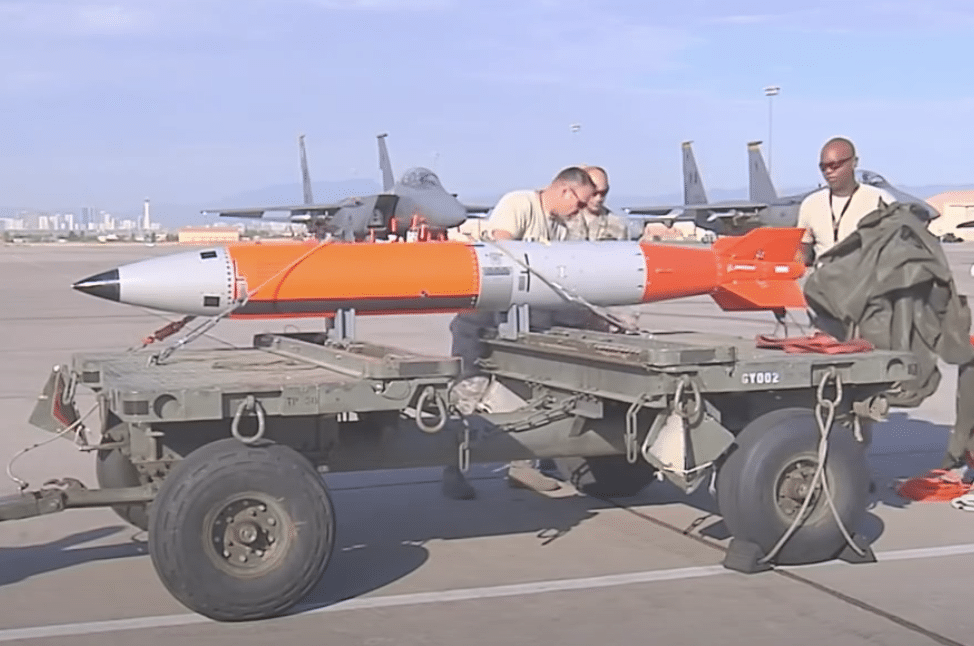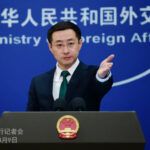What the new posture review says—and does not say—about the future of nuclear weapons
By Victor Gilinsky | November 14, 2022
 A test version of the new B61-12 guided nuclear bomb to be deployed in Europe as part of a modernization program. Photo from a video by Air Force Staff Sgt. Cody Griffith.
A test version of the new B61-12 guided nuclear bomb to be deployed in Europe as part of a modernization program. Photo from a video by Air Force Staff Sgt. Cody Griffith.
On October 27, the Biden administration released an unclassified version of its Nuclear Posture Review (NPR), a Congressionally mandated document, prepared by the Defense Department, that describes administration policy on the role of US nuclear forces. Compared with the previous version released by the Trump administration in 2018, it has a less aggressive air and tightens the range of possibilities for use of US nuclear weapons. But there is a lot of overlap. The main threats remain China, Russia, North Korea, and Iran. And US nuclear forces are described as intended for deterring nuclear (and conventional) strategic attacks on the United States and on its “allies and partners,” and to prevail if it comes to war. Various analysts have already dissected the NPR in detail. But there remain unanswered basic questions: Who exactly are the allies and partners to whom the United States is extending nuclear protection? And why is the nation extending nuclear guarantees to deter conventional attacks on these allies and partners?
Allies and partners. “Allies” would seem to be a definite category, but there is no specific listing in the NPR. Nor is the Defense Department web page of much help, as it only gives “examples” of US alliances—the 29 NATO members and Australia, New Zealand, and Morocco [sic]. Japan and South Korea apparently fall into the category of non-NATO allies, which includes about a dozen countries. Are they all covered by the US umbrella? The NPR doesn’t tell us.
The NPR is even cloudier when it comes to “partners.” The Defense Department blurs the distinction between allies and partners, saying only that partnerships are less formal than alliances. The protected partner category surely includes Israel, even though it has its own formidable nuclear force (something the US government does not acknowledge publicly), and probably Saudi Arabia. Both have been distinctly unhelpful lately in respect to the war in Ukraine, which suggests that US protection does not carry reciprocal obligations. The Department has described Colombia as the United States’ “closest partner in Latin America,” so it must be included. The Defense Department has also referred to a “major partnership with India.” It says it has 76 partnerships, with two or three added each year. Are all of them covered by nuclear guarantees? Not likely, but the unclassified NPR doesn’t say. Perhaps it’s a floating category with the United States deciding who is in or out at any time. In any case, the US public does not know which countries are covered by US nuclear guarantees and that is a problem because it may conceivably lead the United States to a nuclear war and become a target.
Nuclear response to conventional attack. Protecting countries without nuclear weapons against nuclear attack is understandable. (Less clear is why the United States would provide guarantees to countries that have their own nuclear weapons.) But why would the United States agree to protect, with its own nuclear weapons, such countries against conventional attack, and possibly put the United States in the position of being the first country to break the taboo on nuclear weapon use?
The idea of responding to a conventional attack with US nuclear forces stems from the Cold War era when Western Europe had to defend itself against numerically superior Soviet forces. It made no sense even then, not least because West Germany, which the United States was defending, didn’t want to become a nuclear battlefield. Robert McNamara told me, years after he had been Defense Secretary, that despite it being US doctrine to do so, he was determined not to use nuclear weapons against any Soviet conventional attack. (I asked whether he told George Bundy and President Kennedy about it. “No,” he said, “they would have thought me weak,” which tells us a lot about nuclear weapon decision-making.)
The NPR makes clear that the reason we still stick to this doctrine, which presumes a US first use of nuclear weapons, when the principal reason for it has evaporated, is that allies and partners demand it: “US extended nuclear deterrence is foundational to this approach, and Allies and partners can be confident that the United States is willing and able to deter the range of strategic threats they face whether in crisis or conflict.” In a way, the Trump administration’s 2018 NPR is more straightforward on this point: “conventional forces alone are inadequate to assure many allies who rightly place enormous value on US extended nuclear deterrence for their security.”
It suggests the allies-and-partners tail is wagging the US dog. But this is music to the ears of the nuclear weapons establishment, which uses it to ensure generous funding: “Modernizing the US Nuclear Triad and regional capabilities are fundamental elements of US extended deterrence commitments. Only if the United States can deter strategic attack against the Homeland can Allies and partners be confident that US regional extended deterrence commitments are credible.” In short, to credibly meet the demands of allies and partners, the United States must protect itself so effectively that it can use its nuclear forces to protect them with impunity. That calls for a lot of hardware.
The Defense Department’s NPR Fact Sheet gives the following explanation for the importance of this arrangement: “The US global alliance and partnership network is a military center of gravity.” This alludes to Prussian general and military theorist Carl von Clausewitz’s “Schwerpunkt” (“center of gravity”) concept describing the US military doctrine. The Department describes it as “the source of power that provides moral or physical strength, freedom of action, or will to act.” In other words—in the Department’s view, apparently endorsed by the White House—nuclear weapons tie together the global network that gives the United States its worldwide power, including economic power. That power is the benefit for nuclear underwriting of the risk for “allies and partners.”
Civilian control. This putative central role in the global network puts the nuclear weapons establishment in so strong a position that it is almost beyond political control. Of course, civilians can still tinker at the edges, move some funding from here to there, but to go beyond that—for example, to adopt a “no first use” policy—would, in this way of thinking, threaten America’s role as the leader of the global network. Because deterrence is all in the mind of the adversary, nuclear practitioners must avoid any hint of uncertainty about the United States’ willingness to use force. Prudence is easily conflated with weakness. Nothing is more dangerous to an American national security official than the imputation of weakness—as McNamara’s confidence to me illustrates. The need to constantly allay the concerns of allies and partners by demonstrating “credibility” of the willingness to use force biases nuclear decision-making in a dangerous direction.
Future risk. Can the United States, Russia, and a rising China continually hone their nuclear forces, with new generations of their analysts constantly looking for ways to exploit the forces for political advantage, and not slip up with lethal consequences? Perhaps they can, but for how long? Humanity was lucky to survive the Cold War. We are past that, but the weapons still enforce their logic on the users. As national life-and-death decisions may have to be made in minutes, each nuclear weapon country turns over the power to do so to its national leader. Such a leader may assess the situation quite differently than would, say, a professor of deterrence. President Putin gave us all a lesson on this with his war in Ukraine. At bottom, the problem lies in the very existence of nuclear weapons. There is no getting away from this problem.
The NPR claims the United States is pursuing “a world free of nuclear weapons,” yet everything in it points in the opposite direction, toward keeping things as they are. The abolition of nuclear weapons is an unrealistic goal for now, but so is the notion that the present state of affairs can continue indefinitely. The goal of abolition is always going to be unrealistic unless we start talking about it.
Together, we make the world safer.
The Bulletin elevates expert voices above the noise. But as an independent nonprofit organization, our operations depend on the support of readers like you. Help us continue to deliver quality journalism that holds leaders accountable. Your support of our work at any level is important. In return, we promise our coverage will be understandable, influential, vigilant, solution-oriented, and fair-minded. Together we can make a difference.
















The last paragraph of this article is awesome. The logic outlined in the last paragraph is undisputable. I think just today the authors fears have played out. Russia apparently launched missiles that accidentally or otherwise landed in some Polish area and killed two civilians. Now Poland appears to be gnawing at the bit to get NATO involved even if it means taking the whole planet into oblivion. During the Cuban Missile Crisis Castro did the same thing on multiple occasions. And lets not even mention the commaders of the Russian sub that were about to launch a nuclear tipped torpedo… Read more »
When a major power says it’s defending the interests of its allies, it is primarily defending its own interests. Loyalties, as with Israel or Saudi Arabia, are reciprocated only if interests are mutual – or if loyalty can be forced upon the junior partner or vassal. Interests are the ultimate determiner. The proverb of “the dog wagging the tail” can lead major powers into the conflict they desire to avoid, as history shows.
https://patternofhistory.wordpress.com/